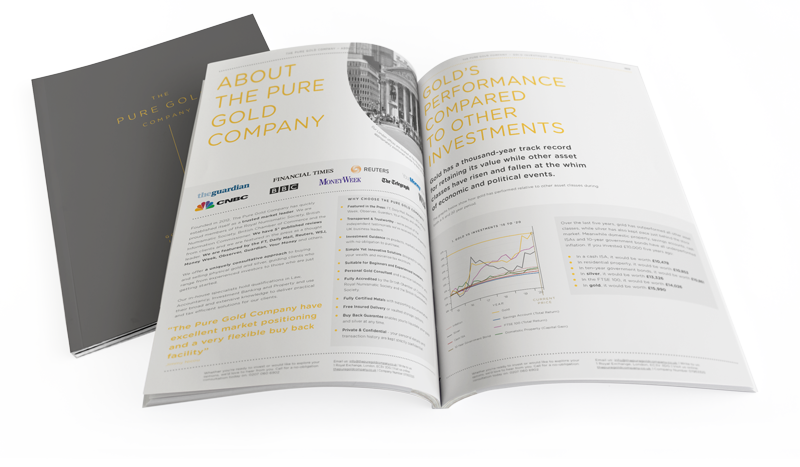Markets thrive on fear and greed. They fall when investors start to worry, and rise when investors rush to make a profit. Volatility isn’t always bad. Experienced investors can use different financial instruments to ‘play’ the market and profit whether stocks go up or down. But for many people, when markets fall, their investments decline so they look for safe-haven assets that can be a buffer against this volatility.
One of the most commonly mentioned benefits of physical gold is the protection it offers against volatility and “volatile investments”. What is a “volatile investment”, and how does gold mitigate its risks?
Volatility is a measure of how much the price of an economic unit (like a share or a quantity of a commodity) is likely to change in the near future. Very volatile shares might rapidly gain or lose value, while more stable shares will stay at pretty much the same price.
There can be all kinds of reasons for investments to become volatile – some, like currency, are inherently prone to changing price rapidly, while others can be influenced by politics, both global and local, business decisions or mistakes, business reputations and public perception and even the actions of individual investors.
Measuring market volatility – The VIX index
The best way to measure volatility in the US economy (and by extension the global one) is the VIX index, sometimes called “The Fear Index”. The VIX is short for the Chicago Board Exchange Options (CBOE) Volatility Index, which measures options derived from the Standard & Poor 500 index, a market capitalisation of 500 major US companies.
Options are a type of financial instrument that gives investors the option (not the obligation) to buy or sell shares at a later date for a specific price. Options are often used to hedge investment positions, which means they are essentially an ‘insurance policy’ to protect investors from share movements. So, when investors are worried about sudden or large changes in the market (volatility), they are prepared to pay more to insure their share positions.
Market sentiment
By tracking the price changes of these options, the VIX can indicate a more general picture of how volatile investors think the market will be over the next month. When the VIX is high, market volatility is high and investments are uncertain, while when it’s low it’s much safer to invest as you’re less likely to get caught in a sudden price spike.
The Covid-19 pandemic prompted a major spike in the VIX index in March 2020, as it surged to its highest level ever, surpassing even the peak created by the 2008 financial crisis. Lockdowns, furloughs, exorbitant government financial aid and uncertainty about the long-term repercussions of these measures sent the market spiralling downwards and uncertainty reached fever pitch.
Download our investor guide
Discover how physical gold and silver investment could protect your wealth and pension. Get started today with our Free Investors Guide.

Since 2020, the VIX has returned to a more normal range, slowly moving from around 30 to about 15 with some spikes in between. In general, a VIX below 20 indicates low volatility, while above 30 indicates high volatility from perceived market risk, uncertainty and investor fear. At the start of 2024, the VIX was below 15, indicating the expectation of low volatility over the forthcoming month.
The VIX and gold
There is not a definitive correlation between the level of volatility represented by the VIX and the gold price, because there are many factors affecting both, however, there is a relationship. The VIX is a proxy measure of fear in the market, and gold is a safe-haven asset. So, when investors are worried about the future performance of their market-linked assets, they may choose to buy gold to protect themselves from the volatility they perceive.
Impacts of volatility

- The value and stability of your portfolio can be affected overall by price volatility
- High volatility means a greater chance of a shortfall if you’re planning to liquidate your investments for cash
- Higher volatility makes it harder to save for the long-term or retirement, as you can’t rely on your investments to hold their value
- When retired, the more volatile your investments, the less money you may have to draw upon.
- On the plus side, volatility gives you the chance to buy investments cheap and sell them when they rise
Gold – the opportunity to benefit from volatility
As a safe-haven asset, gold has a history of increasing in value when other assets like stocks in the stock market fall, which means gold can protect your portfolio from sudden market declines. But it can also allow investors to benefit from the volatility. Gold bullion is easily and quickly liquidated, so investors can then buy stocks at these new low prices and sell when the market recovers.
Of course, timing is key. Not everyone knows when markets will fall or when gold prices might rise, nor whether the stocks they have already bought will recover from the volatility. Gold provides a stable long-term investment in a diversified portfolio, acting as a buffer against volatility in an uncertain world.

Investment decisions
Having a strong physical gold base to your portfolio allows you to not only avoid the risk of complete financial ruin from a high VIX, it also gives you a stable platform from which to risk more disposable money and try to make sizeable gains from a more volatile investment environment. Remember, a high VIX level isn’t necessarily something to be feared if you have a solid, inflation-immune base of capital to fall back on – something that gold investment provides.
Why Buy Gold In 2025?
Discover how physical gold investment compares to other investment assets for growth and protection.



